Before Before Midnight
(from Sag Harbor Express Online 6/28/13)
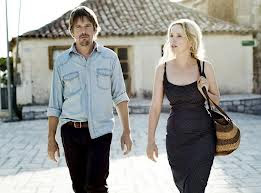 Jesse and Celine, still walking and talking
Jesse and Celine, still walking and talking
I hope everyone sees Richard Linklater's Before Midnight at the Sag Harbor Cinema
beginning on Friday. It's a splendid
third part to the continuous screen romance of Julie Delpy's Celine and Ethan
Hawke's Jesse that began on a train in Before
Sunrise eighteen years ago. In the
first film, the smart, sexy young strangers--he's American, she's French
--boldly spent a fateful night in Vienna, chatting, chatting, chatting and
falling in love, forever. They seemed
destined to reunite and be together always, but in the second film, Before Sunrise, made nine years later,
we learn that they hadn't rendezvoused again as they'd promised each other and
now had different partners. While he's
in France
Interview with
Richard Linklater
Danny Peary: Was Before
Sunrise more autobiographical than Before
Sunset?
Richard Linklater: Yeah, it was more autobiographical and
personal.
DP: Did you write the first film with Ethan Hawke or Julie
Delpy in mind?
RL: I didn’t. I
didn’t know them then. I knew whoever
was cast would have to take over the film.
Even though I had the script, it would have to be personal for
them. The script was just what I needed
to get things going, giving it reality with characters and locations. But what the film was going to be was what we
did at rehearsals and going to a level we couldn’t imagine at the beginning.
DP: When you finished Before
Sunrise, could you predict what happens between Celine and Jesse in Before Sunset?
RL: We didn’t expect to make another film at that time. We had to wait nine years to reach this
point. I always felt Celine and Jesse
would get together, but Julie and Ethan didn’t always think that.
DP: Was there one thing that made you all want to do an
update on the characters?
RL: I think it was the real-time aspect for a second
encounter. We fooled around with all
kinds of ideas and distilled them into one idea: a real-time encounter in which
they more or less run into each other because he's promoting his book about
their previous meeting but has to catch a plane in a couple of hours. Those
were the parameters we set up, our zone, and everything went from there. Our
challenge was to make it seem like real time.
It was like being painted into a corner.
Everything had to be timed perfectly and it had to be accurate geographically.
It worked like a play in that whatever
we were shooting that day would be in the final film. There would be no extra scenes on a DVD
because there was nothing else, this is what we shot.
DP: For Before Sunrise
Kim Krizan and you are the credited screenwriters, and Ethan and Julie didn't
receive writing credit. But this time it's
you, Julie and Ethan.
RL: I think all films reflect a director’s personality, but
this film reflects Julie and Ethan to a large extent because they were my
collaborators all the way down the line for years. They had to give so much of themselves to
creating their characters that it was logical we’d write the film
together. Kim elected not to. Ethan, Julie and I outlined it very
specifically. We communicated by email and
faxes, sent each other things, and each of us jumped on things we wanted to
write about. The film was personal to all of us. Ethan wrote a lot when he was really happy
about being a father. Was he foretelling
something, or is what happened to his character so common? A lot of that came from me too, because I
have kids. We were in the same room only sporadically but when we were it was
very intense and fun because we have a great chemistry. It was a long process
to write the first script, taking over a year.
DP: You were writing with one male and one female, so did
you worry it would be too male driven rather than balanced?
RL: No. I don’t relate to one of those characters more than
the other. I’m probably closer to Celine
than Jesse life-wise. I wouldn’t divide
it into masculine-feminine.
DP: The acting comes across as so natural that it seems as
if Ethan and Julie are improvising.
RL: During the rehearsals we rewrote the script based on
their improvisations. But then it was a final script and they stuck 100% to it.
Even the most minute gestures were worked out in advance. I wanted it not to be
noticeable that they were acting or that a film was being made. I wanted it to be like you were encountering
an old friend and were happy to see him.
That was the right vibe for the movie.
It was interesting segue for Julie and Ethan to go from cowriters to
actors because the enormity of their task was apparent. It took a lot of rehearsal to get it right. It seems like we just turned on the camera
and followed them as they walked and talked but it was all planned out for how
we would get from one location to the next. They had to really work so hard and
internalize it so well that it would come out naturally and spontaneously.
DP: How did you shoot them, particularly during their long
dialogues when walking?
RL: There were some pretty difficult steady-cam shots. On some scenes I used two cameras but for the
most part one.
DP: Once again you've made a film with a lot of dialogue:
RL: It’s hard to pull off but it must be innately what I’m
interested in because I keep doing it over and over. Here I am making another film in which all my
characters do is talk. I guess it’s
natural to me, but at my core it’s something I was interested in before I even
picked up a camera. Dialogue with people
saying things and not saying things and how they express themselves to me has always
interested me. I like people. At the
core, that’s what we have to go through in our lives—communication, what I’m
doing now with you. From that you can
judge my personality. To me that’s life.
We don’t live in action films.
Talking is the majority of our experience. I wasn’t the kind of guy to sit in a coffee
shop and have conversations with people; I was too busy reading or doing
stuff. I’d even tell my friends, "What
you’re doing is fine, but I’m spending the day reading Dostoyevsky." I didn’t want to talk or hear other people
talk. But when I started making films, I
had people talking and expressing ideas.
DP: After nine years, Celine and Jesse haven’t forgotten
each other and that has prevented them from being happy with anyone else. And
I'd say that if they’d never met, they both would have longed for someone
similar. So in this film is their
relationship confirmed to be emblematic of true
love?
DP: But this is the love of their lives.
RL: Yeah. After the
first film I got letters saying, “I met someone on a train in 1970…” I think it reminded older people of something
earlier in their lives. I think people
who were the same age as the characters had the same anxieties—so it resonated
in retrospect more than it did in the day.
People might relate more to this film because the two have life baggage
that is common to all of us.
DP: Do Jesse and Celine again try to seduce each other in
the second film?
RL: I think so.
What’s going on between them is flirtation, seduction, it’s what people
do when they’re attracted to each other.
It’s different because they have been together before and they’re
revisiting old feelings. It’s pretty
important to both of them—and they’re leading each other on, trying to show who
they are at this moment.
DP: At the time you expect them to kiss, he says he's
married and she says she has a boyfriend, it’s jarring…
RL: What I find interesting the whole time is what they’re not saying, what they’re not comfortable
going into just yet, even though they have only a short time frame. What each other feels means to much to them
but they’re being casual about it because the other person might not share
those feelings. They don’t want to reveal
anything if the other person won’t reciprocate.
That’s masochistic.
DP: I was also jarred when Jesse and Celine smoke.
RL: Julie and Ethan do smoke. We made decision not to have the characters smoke
in the first film. I thought it was kind
of telling, I don’t know of what exactly.
DP: Maybe it says something about their being older. I’m
sure some people will like them better now than the young people in the first
film.
RL: People can be kind of merciless on young people. They’re kind of tender and forgiving until
they are 17 and there is a rough patch when they’re 18 to 22 or 23. The world comes crashing down on you at that
age—you’re a punk, you’re pretentious, you should get your act together. I’ve done films with people that age because
there’s little empathy for them. Older
people say they’re glad they’re not that age anymore, but you have to go
through it. They say your personality is
formed at 25, and your view of the world is established, so it’s a trying time
in your life as you become who you are going to become—but it’s also
exhilarating and real.
DP: At the end of this film, Jesse knows Celine won’t tell
him to leave.
RL: Yeah but she’s been a slower read I think, because he’s
the one who has more responsibilities and baggage. We caught resistance getting
the film made because some people complained he’s married and she’s not. We’d say, “Come on, this is the real world,
with a lot of unhappily married people.
We don’t know his wife’s situation—she might be back home in bed with
someone. There are two sides to any relationship
that’s not working."
DP: Do you think people will think the end isn’t really
satisfying because it isn’t a real end?
RL: I hope not. This
was our end in the outline, where the movie was going to end. It was going to get real-worldy right after
that, so I can’t imagine continuing with the story. If someone is dissatisfied, it’s probably
someone who wants something literal, “tell me the whole story” and maybe they
shouldn’t be at the movie to begin with.
DP:I think there is a definite ending, don’t you?
RL: I think so.
DP: The shot of Julie Delpy/Celine, seen through the eyes of
Ethan Hawks/Jesse and your eyes, is that she’s the perfect woman that he and
every other guy can't help but fall in love with. Imperfect but perfect.
RL: There you go. We
talked about that. When we were working
on the outline, Julie was talking about seeing Nina Simone in concert and I was
sitting across from her just like Ethan is in the movie. I said that’s the end of the movie.
DP: Do you see making another film to revisit these
characters in a few years?
RL: Obviously we could do it. The fact that we’ve done this film says we
could. Whether we will or will not make
a third film is up for grabs. I’d love to work with them again. I’ve been lucky to work with Julie three
times and Ethan five times so far. I
can’t complain.
Interview with Ethan
Hawke and Julie Delpy
Danny Peary: How difficult was it collaborating on the
script for Before Sunset, faxing and
emailing each other back and forth?
Ethan Hawke: Well, we had done it before. We worked pretty hard on Before Sunrise, so we had a pretty good idea of how to do it.
Julie Delpy: When we started in 2002, we had an outline that
was basically the film from beginning to end with whatever Celine and Jesse
were going to talk about in every scene, more or less, and an emotional
progression. Then we went our own ways
and gave each other assignments to write certain bits. I would want to write a scene, and Ethan
would want to write a scene, and Rick would want to write a scene—and then we’d
send them to each other.
EH: We would then get
together and sit with all the papers and try to piece it together. It was like a workshop. The whole idea was to figure out what would
happen to our characters in real time after being apart for nine years.
DP: Did you usually agree with each other?
JD: We agreed on
everything. We never had arguments about
the direction we were taking them.
EH: We had enough ideas so that if one person felt
uncomfortable with one, we could easily throw it out.
DP: Strange question—did you really have to know and trust
one another so that the characters would have such strong feelings for each
other?
EH: When you write together you find out so much about the
other person.
JD: Especially in the
way we wrote together on these films where we had to open up entirely and can’t
have bullshit; you have to give everything, you have to get to know each other
100% in very little time. So it really
helped that we have known each other for a long time.
DP: Had you seen Before
Sunrise since it came out and if not, were you surprised by how you looked
then?
EH: I hadn’t seen it
during all those years and I couldn't imagine that I'd changed that much.
DP: Do people come up to you with stories of one-nighters
that Before Sunrise reminded them of?
EH&JD: YES, ever since the film came out.
JD: Every American man I meet when I’m in Europe
who has seen the movie tries to get into a conversation with me.
DP: Would you have thought Celine would have met Jesse years
before as they planned in the first film?
EH: I knew that he would come to see her. I felt strongly that he would definitely show
up. The funny thing is that once we
started filming a movie about them seeing each other for the first time in nine
years, it had to be that one of them didn’t show up for their meeting years
before. So a lot of what we wrote was
forced by the passage of time. If we had
written that they had both shown up and gotten married and had four kids then
it’s another film.
JD: Yes, it would be another film. We wrote that Celine couldn’t come that day
because of an emergency involving her grandmother. I had mentioned the
grandmother in the first film. So they
missed their opportunity then. In this
film we wanted to talk about the idea
that the person you met for just one day when you were young and imagined was the one person for you could actually be
the person. It's a scary thought. Because people will think it was just youth
and a “first love” that never worked out and those feelings were just in their
imaginations. But maybe it really would have worked out because they were right
for each other.
DP: Do you believe it's true love?
EH: They obviously
have a very deep connection with each other that surpasses the ordinary. But it’s never had a chance to manifest
itself in a daily way, so I don’t think they really know if it’s there. They just know how good it is to be near one
another. In many ways, both movies are a
metaphor—one night, one afternoon, it could be one year—for entire lives.
DP: Is it best that they spent all these years apart? Certainly they grew as people and experienced
life before reconnecting as adults, and now maybe they are mature enough to
realize and appreciate what they have in each other?
EH: If you talk to older people, you’ll hear many stories of
successes and failures in relationships.
Relationships are tough.
JD: I think the characters were wise when they were young so
could realize the other was special then.
EH: They make fun of
themselves as young people in both films, but they’re pretty much the same
people now as they were then—including how they see each other.
JD: We can change, we
can evolve and grow, but the core of who we are and how we sense things and
experience and feel the world is pretty much the same from the day we’re born.
Because that's how we’re “wired.” If
you’re a sensitive person, you can become stronger but you’ll remain
sensitive. Artists and writers have a
certain sense that was there from the beginning.
DP: Do you think that because this film is set in Paris
JD: It’s where she lives and works. It is
her city so it puts her in the position of taking him around. But though Paris
EH: To me, Paris
DP: Ethan, do you think this film is from the male
perspective, possibly because there were two male writers.
JD: But I count for two!
EH: Celine has many more lines than Jesse. I think it is
more her movie. It is his gaze though. Both movies open and end with him gazing at
her.
DP: At the end, we look at you, Julie, as Celine, with the
eyes of Ethan, Jesse, and Richard Linklater, and I think we’re supposed to see
the “perfect dream woman” for most guys.
JD: Because it was directed by a man, I think there is male
point of view, so it was a challenge in both films to not turn Celine into a
man’s ideal of a woman or the extreme opposite, where she’s cold. I tried to find the right balance between a
smart, young woman and a woman who is emotional and vulnerable, and have her be
attractive but not in a way where she’s trying to be cute and flirtatious. Rick always wanted her to be appealing but
real.
DP: And Celine, like Jesse, is funny.
EH: Julie is funny, I’m the straight man. I’m her Dean Martin.
JD: Do you mean I’m
Jerry Lewis?
DP: Who came up with the line about American men being
horny?
EH: Julie, that was you…
JD: Celine is the one
who broaches the subject of sex. She’s
always the one who starts talking about it.
EH: We wanted them to have a nice, playful sense of humor
about sexuality. When you’re younger you
have a very juvenile sense of humor about sexuality, if you have a sense of
humor at all about it.
DP: In the first film they were very idealistic, in this
film they are older and more cynical, although Celine’s job shows she is still
idealistic politically, if not personally.
EH: They don’t want to lose their sense of idealism, and
seeing each other awakens it. That’s why
they are so happy to see each other.
JD: She is totally an idealist.
DP: But she’s sad and disenchanted.
EH: But most idealists are sad because the world is
disappointing.
DP: An obvious question: How much of the film reflects your
real life?
EH (straight-faced): It’s actually my entire real life. It’s a
documentary and the hardest thing was going back and looping in the names Jesse
and Celine.
JD: The classic
French actor Louis Jouvet said, “You have to put a little life in your art, and
a little art in your life.” So it’s a
little bit of that, where we put in real things from our own lives and
experiences to give it truth. But at the
same time, there are many things that are just invented for the film. There is a lot in Celine that I relate to and
I was able to write her because I understand her psychology, but I am very
different on many levels. I have had
friends thank me for putting a little bit of them into Celine.
EH: We would talk to
each other about our friends and relate their stories and some of that would go
into the characters.
DP: There are many elaborate long takes of you two talking
as you walk through Paris
EH: That was all difficult; it was exhausting. We had to do both films with sunlight in
mind, so we were limited when we could shoot.
Because the movie was happening in real time, we knew nothing would be
cut.
JD: So we couldn’t mess up anything.
EH: We weren’t allowed to add anything. Even when we
were rehearsing and tried to add lines, Rick would stop us and say, “No, it’s
over. You can overlap the dialogue or do
other things, but you can’t add lines.”
If actors start improvising you can tell because they start saying “you
know” and “like” and “f**k.” It should
be a choreographed piece of music, where there is talk and the silences fall.
JD: If shots were messed up by something happening in the
background we’d have to throw it out and start over. If the light changed when we turned a corner
when walking, it was difficult. We would
decide then to wait for the light at 6 pm, but then there would be clouds, so
it was difficult.
DP: When Celine and Jesse walk up the stairwell to her
apartment, there is no talk.
JD: It was written
that way. After all that talking to each
other, they are entering another stage in their relationship. Now they know what they mean to one
another.
DP: At the end, Jesse watches Celine imitating, almost
channeling Nina Simone--where did that reference come from?
JD: During the time
we did the outline, I put on a Nina Simone record I loved and imitated her in a
concert I had just seen. And Rick
decided to end the film that way. So we
wrote it in.
DP: How did your view of filmmaking change from making this
film?
EH: Rick and Julie taught me so much. They both have such a love of cinema, and I
learned so much about movies and art from them.
So I took a lot from the movie.
JD: I learned a tremendous amount. I learned to truly collaborate with
people. I’ve heard it from other
directors that the bad directors are the ones who won’t listen and be open to
others’ ideas. I’ve now really noticed it.
Rick is totally open to proposals and knows when to say yes and when to
say no. I had written when I was very
young but had quit writing when I was twenty for very specific reasons. And then for Before Sunrise I started writing again. It brought me back to writing, so it was
essential to me.
DP: Do you want to work together again?
EH: As collaborating writers, these two movies are our
forum. But I’d like to work in Julie’s
pictures. She has written several
scripts that are outstanding.
JD: I have films to act in first, but I plan to direct my
own films after that.
DP: Could you do another film with these two characters down
the road?
JD: We don’t know
yet. In another life. Only if we have something really meaningful to say. The time it took to decide to bring the
characters back was really quick, but it took us some time to really figure out
what we wanted to say. It makes no sense
to do another sequel if we have nothing to say on the subject.
EH: We could do another film in two years or maybe
thirty-five years.
Julie: Right. We’re not going to do a new film every nine
years.











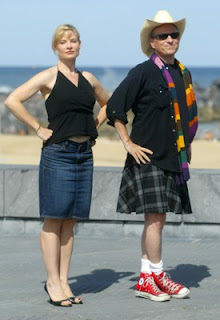 Melinda Page Hamilton and Bobcat Goldthwait
Melinda Page Hamilton and Bobcat Goldthwait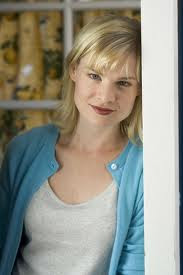 Melinda Page Hamilton
Melinda Page Hamilton



 Gatsby and Daisy
Gatsby and Daisy Daisy
Daisy Nick and Gatsby
Nick and Gatsby
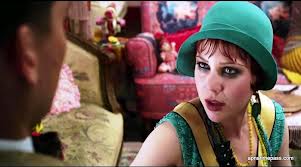 Myrtle (Isla Fisher)
Myrtle (Isla Fisher)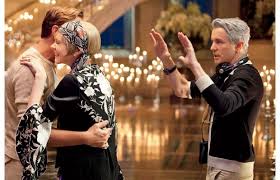 Baz Luhrmann directing DiCaprio and Mulligan
Baz Luhrmann directing DiCaprio and Mulligan Morton Downey Jr.
Morton Downey Jr. Directors Seth Kramer (L) and Daniel L. Miller Photo: DP
Directors Seth Kramer (L) and Daniel L. Miller Photo: DP Downey Jr, always on the attack
Downey Jr, always on the attack
